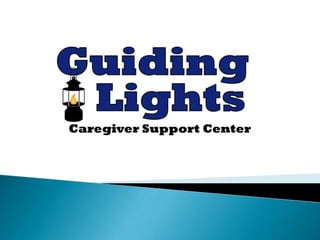
Guiding Lights Presentation 09032011
- 2. To be the comprehensive caregiver support center for family and professional caregiving Vision
- 3. Contrary to myth, most older adults do not reside in a nursing home (more appropriately called a long-term care facility). In fact, only about 5 percent of older adults in the United States reside in a long-term care facility; 24 percent for those 85 or older. Long-Term Care Statistics
- 4. True or False? The majority (more than 50%) of older adults will become senile (defective memory, disoriented, demented) during old age. False 2-3% of adults in their 70’s experience dementia 5-10% percent of older adults in their 80’s 20-30% percent of older adults in the 90’s Myths and Reality Of AgingTaken From: Linda M. Woolf, Ph.D., Webster University http://www.webster.edu/~woolflm/myth.html
- 5. The percent of older adults in the United States has been steadily increasing. In fact, the percent of individuals over 65 in the U.S. has risen from less than 5 percent in 1900 to approximately 12.4 percent 2007, and is expected to reach 22.9 percent by the year 2050 In 2006 there were 73,674 persons aged 100 or more! Minority or Majority?
- 6. True or False? Most older adults are rejected by their children False - Older adults are not rejected by their children simply as a function of their age. Over 70 percent of older adults have a child living in close proximity (within 30 minutes). Over 1/2 of these individuals have visited with one of their children within two days prior to being surveyed Tossed Away Because of Age?
- 7. Each year, family caregivers provide an estimated $257 billion/year in informal care services (National Family Caregivers Association [NFCA], 2005). A majority of people with chronic and disabling diseases rely on informal caregivers, often family members, for the provision of care. According to the 2000 Behavioral Risk Factor Surveillance System (BRFSS), less than 13% of persons with disability (PWD) who reported needing care assistance were using paid caregivers. It is estimated that 21% of the adult U.S. population provided unpaid care to an adult(≥ 18 years old) family member or friend who needed the care (NAC and AARP, 2005). Need in the Community
- 8. Caregiver age has been found to be a major factor associated with informal care. The average age of caregivers in the U.S. is 46, and 58% of the caregivers are between the ages of 18-49 Spousal caregivers were as likely to be men as women, and men were more likely to provide informal care without assistance from others. Women tend to maintain the care giving role longer than men and are less likely than men to request additional informal support. National Caregiving Statistics
- 9. Survey Sample Size: 2,997 Who would you call to arrange for short or long term care? Relative or Friend: 20.5% Self: 22.4% Medical Support: 22.4% Religious Support: .2% Area department on Aging 1.9% Other 3.5% Don’t know: 26.8% North Carolina Caregiving Stats
- 10. 60% of North Carolinians cope with caregiver stress by seeking advice. Over 20% of respondents on both surveys indicated needing more help or information in making end of life decisions, managing emotional and physical stress, balancing work and family, and keeping the care recipient safe at home. Unlike the national response, caregivers in North Carolina demonstrated a substantial need(37.1%) for more information on “easy activities” to do with the care recipient. This ranks as the second greatest unmet need for North Carolinians and is substantially higher than the 27.1% of respondents nationally who indicated a need for help in this area. All care giving statistics for this report taken from: Care giving: A National Profile and Assessment of Caregiver Services and Needs Unmet Needs of North Carolinians
- 12. Long distance care giving
- 13. Disease and behavior management
- 15. Support Groups Support groups will be facilitated at Guiding Lights and at other communities in the area. Free service to family caregivers Paid by corporate sponsorship or grants
- 16. Free service to family caregivers Donations of books given by publishing companies Purchase of books covered by grants and corporate sponsorship Resource Lending Library
- 17. Professional &Family Caregiver Training Professional caregiver trainings that will offer CEU’s for AL’s, RN’s, and SW. 6 or more family caregiver trainings per year Potential for local, regional and national trainings Trainings paid for by corporate sponsorship, individuals, grants, and pharmaceutical companies
- 18. CNA Training Site The Certified Nurse Assistant (CNA) Training Course is a 125hour North Carolina State approved and regulated program which trains individuals to become Level I CNAs. Full or abbreviated course Competency testing as needed Potential for becoming training site for area Assisted Living and Skilled Nursing Facilities
- 19. Onsite training and competency lab for professional and family caregivers. Skills Laboratory
- 20. Resource Referral and Placement Specialists Goal: To provide the most comprehensive caregiver guidance in the triangle, e.g. caregivers in their LTC decision making process, etc. Paid for by corporate sponsorship, individuals and grants
- 21. Guiding lights will produce DVDs that educate the consumer about long-term care as well as other educational DVDs to assist caregivers in their caregiving roles Multi Media Education
- 22. Provide caregivers with access to preferred providers to assist with the care needs of the care receiver: Geriatric Care Manager Massage therapist Pharmacist Home health Durable medical equipment Private social workers Reverse mortgage specialists And the list goes on and on… Provider Space“Everyone’s Space”
- 23. Collaborations exist with the Florence Adult Daycare Center and SarahCare to provide free respite for family caregivers so that they can have peace of mind while they are visiting Guiding Lights. Adult DayCare CollaborationFree Respite for Family Caregivers
- 24. Our LocationOff of Women’s Club Drive in Raleigh3724 National Drive, Suite 130 Raleigh, NC 27612“Camden Building”Call or stop in Monday thru Friday 10am-5pm, Saturday 9-12919.371.2062